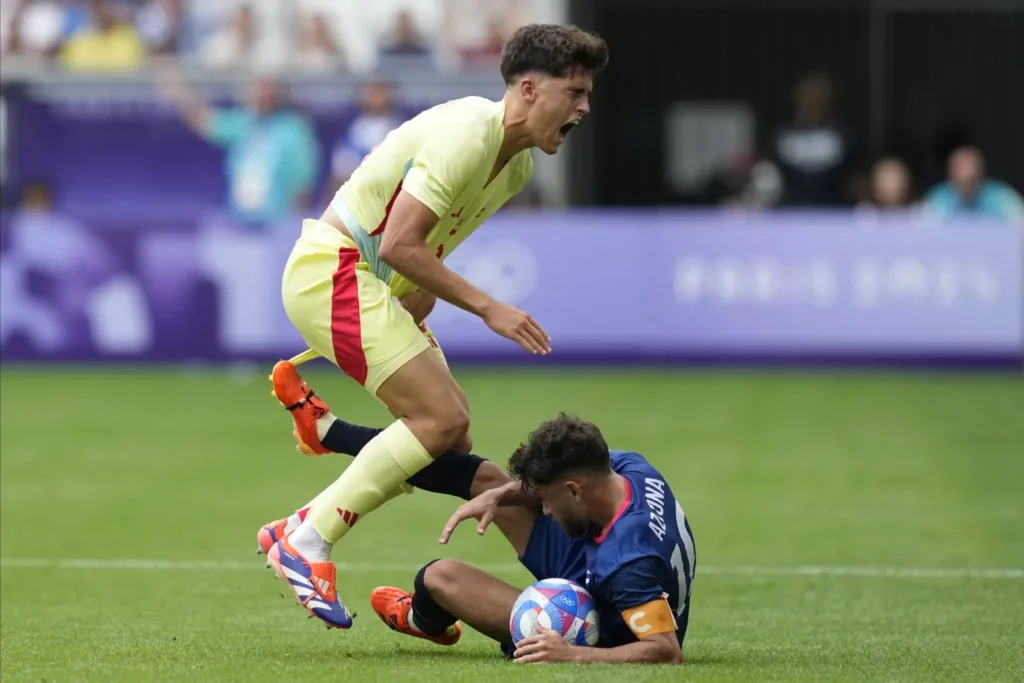Introduction
In a dramatic turn of events during the Olympics on Saturday, the Dominican Republic’s Edison Azcona faced a significant setback in his team’s 3-1 defeat against Spain. The match, held at the Stade de Bordeaux, was marked by a contentious incident involving Azcona, who was sent off for a violent kick to Spain’s Pau Cubarsi. This moment, occurring just before halftime, had a substantial impact on the game’s dynamics and ultimately on the outcome for both teams. This article delves into the details of the incident, the match’s progression, and its implications for both teams as they navigate the Olympic tournament.
The Incident: Azcona’s Controversial Red Card
A Disruptive Moment
The Dominican Republic’s clash with Spain was shaping up to be a fiercely contested encounter. The teams were locked in a 1-1 stalemate, with both sides showing resilience and tactical prowess. However, the balance of the game shifted dramatically in the first-half stoppage time when Edison Azcona was involved in a controversial incident.
While on the ground, Azcona delivered a kick to the groin of Spain’s Pau Cubarsi. The action was swift and, according to referee Adel Al Naqbi, egregious enough to warrant immediate intervention. The referee brandished a straight red card, signaling Azcona’s dismissal from the game. This decision sparked immediate protests from Dominican Republic players, who argued against the severity of the punishment.
Referee’s Decision and Immediate Reactions
The referee’s call was met with a mix of disbelief and frustration from the Dominican Republic’s squad. Azcona, who had been a crucial forward for his team, now found himself on the sidelines, watching as his team was forced to continue with a man down. Cubarsi, on the receiving end of the kick, was left in considerable pain, rolling on the field as medical staff attended to him.
The Impact on the Game
First-Half Dynamics
At the time of Azcona’s dismissal, the match was still tied at 1-1. Spain had opened the scoring with Fermín Lopez’s goal in the 24th minute, but the Dominican Republic equalized through Angel Montes de Oca in the 38th. The game was evenly poised, and the red card introduced a crucial shift in momentum.
With Azcona off the field, the Dominican Republic was forced to adjust their tactics, scrambling to maintain their defensive shape while looking to capitalize on any counter-attacking opportunities. Spain, on the other hand, seized the opportunity to assert their dominance.
Spain’s Second-Half Surge
The second half saw Spain taking full advantage of the numerical superiority. Alex Baena scored in the 55th minute, restoring Spain’s lead and putting additional pressure on the Dominican Republic’s already strained defense. The Spanish side’s control over the game became more pronounced, with the Dominican Republic struggling to mount an effective response.
The final blow came in the 70th minute when Miguel Gutierrez added a third goal for Spain, sealing a decisive 3-1 victory. The Dominican Republic’s efforts to rally in the closing stages were hampered by their reduced numbers and the psychological impact of Azcona’s dismissal.
Analysis of the Match and its Aftermath
Tactical Shifts and Strategic Implications
The red card fundamentally altered the tactical landscape of the match. Spain, benefiting from the extra player, adjusted their formation to exploit the gaps in the Dominican Republic’s defense. The additional space allowed Spanish attackers to maneuver with greater freedom, which was evident in their ability to score two more goals in the second half.
For the Dominican Republic, the absence of Azcona—one of their key offensive players—was a significant blow. The team had to reorganize their strategy, focusing on a more defensive posture to counteract Spain’s attacking prowess. Despite their efforts, the team was unable to recover from the deficit created by the red card and Spain’s subsequent goals.
Implications for Both Teams
Spain’s victory secured their advancement to the quarterfinals, a crucial step in their Olympic campaign. The win not only showcased Spain’s ability to capitalize on advantageous situations but also demonstrated their resilience in overcoming challenges posed by the opposition.
For the Dominican Republic, the match was a harsh lesson in the impact of disciplinary issues on tournament performance. Azcona’s red card and the subsequent loss highlight the importance of maintaining composure under pressure, particularly in high-stakes matches.
Conclusion
The encounter between the Dominican Republic and Spain at the Olympics was a dramatic and pivotal moment in the tournament. Edison Azcona’s red card for a kick to Pau Cubarsi’s groin was a turning point that shifted the balance in favor of Spain. The match underscored the critical role of discipline in competitive sports and the often unforeseen impact that a single moment can have on the outcome of a game.
As Spain progresses to the quarterfinals, they will carry forward the lessons learned from this encounter, while the Dominican Republic will reflect on how they can better manage such situations in future matches. The dynamics of the game serve as a reminder of the fine margins that can determine success or failure in international tournaments.
For more in-depth analysis and coverage of soccer events, visit our Soccer category.


